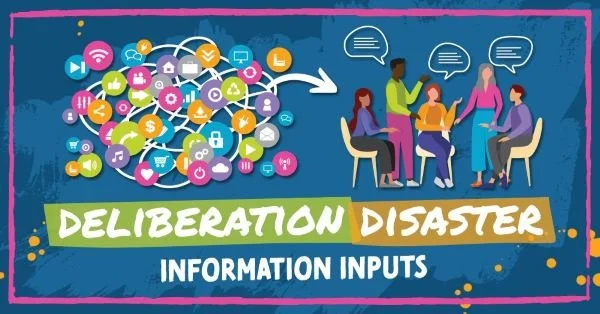Elevate your engagement on every level by asking the right questions! Learn how to cut through the complexity, guide participants to think deeply and ensure diverse people can contribute meaningfully. Quality questions equal quality outcomes. Join us on Thursday May 23 at our FREE Lunch and Learn webinar for tips and skills you can use every time you plan for engagement.
WHEN DELIBERATION GOES WRONG: POWER
Power is always at play and often in surprising and unexpected ways. It’s your job as a project manager, leader, facilitator or engagement professional to notice and foresee power problems, address and prevent power imbalance and protect the integrity of your engagement process. In this deliberation disaster we let you know where power issues tend to lie, what you can do about them, and what your role is in tackling them.
WHEN DELIBERATION GOES WRONG: COMMUNICATION
Deliberative engagement aims to build trusted decisions. That’s only achievable if the people impacted by the outcome have access to information about the process. This isn’t as easy as telling your communication team to send out a media release or publishing a few social posts telling your community the panel or jury is happening. Your communication approach needs to be thoughtfully planned, aligning communication and engagement efforts and ensuring deliberative principles aren’t compromised.
CONFLICT AHEAD? 3 BIGGEST MISTAKES AND WHAT TO DO INSTEAD
Conflict - generally feared and constantly mismanaged, it’s one of the biggest challenges you will face in engagement. It’s also the most common challenge our subscribers submit to us. If you anticipate conflict, outrage or emotion ahead, this article is for you. Inside - how to avoid the three biggest errors we see made (and they are made a lot) and some simple, yet effective things you can do instead to navigate the situation instead of making it worse.
WHEN DELIBERATION GOES WRONG: POOR TOPIC CHOICE
What are you asking your participants to help you with? Topic choice and how you craft the question, challenge or remit you put to your community is critical to a successful process. In this deliberation disaster, we explore the most common mistake we see made. Plus, there are free tips for selecting and communicating a topic that will result in better response rates, a more meaningful experience for participants and more useful outputs for decision makers.
WORKING WITH INTERPRETERS
Engagement processes must be accessible if diverse voices are going to be included. One of the many ways we can achieve this is through the use of interpreters (both for online and face-to-face engagement). If you’re working with interpreters it’s essential to collaborate with them and think carefully about how the session will be facilitated. We spoke to Bruce Song, a Mandarin interpreter whose worked with us previously.
YES, THANK YOU
We accept the very generous invitation of signatories to the Uluru Statement from the Heart to walk together in support of a Voice to Parliament. We believe that amplifying the voices of Traditional Owners in decision-making is critical to achieving a better future. We support the alteration of the constitution to recognise the First Peoples of Australia by establishing an Aboriginal and Torres Strait Islander voice.
IT'S INTERNATIONAL FACILITATION WEEK! HERE'S 4 FACILITATION SKILLS YOU CAN TRY TODAY
Facilitation is a practice, and that means facilitators never stop learning, no matter how experienced they are. We’re constantly working to refine our skills, and we’re committed to sharing our knowledge with others. To honour International Facilitation Week, four of our facilitators are sharing techniques anyone can try out. Give them a go next time you’re involved in an interaction or group conversation, even if you don’t normally think of yourself as a facilitator.
WHEN DELIBERATION GOES WRONG: INFORMATION INPUTS
Deliberation – what can go wrong? The short answer is lots! In our second article in this new series, we tackle ‘information inputs’. We’re talking about information you feed into a deliberative process to support the deliberating group’s discussion. It’s super important to get this right and the quality of what you put in will affect the quality of what you get out. So, we’re helping you avoid potential pitfalls and learn from the mistakes of those who have gone before you. Learn what to do (and what not to) inside …
NYERNYILA! DJAARA FOR DEEP LISTENING
Nyernyila (nyurn-yil-ah) means deep listening in Djaara language. Created by Racquel Kerr, a Dja Dja Wurrung/ Boonwurrung woman who recently co-facilitated the Environmental Protection Authority Traditional Owner Forum with us, the piece is a visual story. Nyernyila reflects the core principles of MosaicLab: flexibility, flow, and integrated engagement to inform common goals. Learn more about an extraordinary artwork by a very special artist.















